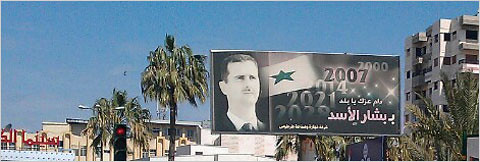
Billboard supporting Syrian President Bashar Al-Assad during a period of unrest inside this Middle Eastern state. Assad delivered a speech to the Syrian parliament on March 30, 2011 saying that there was a foreign plot against the country., a photo by Pan-African News Wire File Photos on Flickr.
12 August 2011
Last updated at 20:11 ET
Syria: Clinton urges states to cut ties over crackdown
US Secretary of State Hillary Clinton has urged all countries to cut their political and economic ties with Syria.
She said buying oil and gas from Syria and exporting arms there were giving President Bashar al-Assad "comfort in his brutality".
Mrs Clinton's comments came as large anti-government protests continued despite a harsh army crackdown.
Activists said at least 16 people died on Friday as protesters came under fire in towns and cities across the country.
More than 1,700 people have died and tens of thousands have reportedly been arrested since the uprising against the 41-year rule of Mr Assad's family began in March.
Correspondents say there is little the US can do to directly pressure the Syrian regime, with which it has few ties or shared interests.
So Washington has been stepping up the pressure on Europe, Russia and China, to use the leverage that they do have, and on Friday Mrs Clinton extended the pressure to all those with ties to Damascus.
"We urge those countries still buying Syrian oil and gas, those countries still sending Assad weapons, those countries whose political and economic support give him comfort in his brutality, to get on the right side of history," she said.
Despite all the killings and arrests, protesters are still braving the dangers to keep the uprising alive, even in areas where defiance has been repeatedly suppressed.
Now, they are taking fresh heart from the mounting outside pressure on Mr Assad to stop the violence and relinquish power.
Among others, the Americans are getting increasingly impatient. There is not much they can do themselves to pressure a regime with which they have few ties or shared interests.
There has been no real sign on the ground of a serious response by Mr Assad to all the pressure from the outside world, beyond promises and a few cosmetic gestures. But the mounting outside pressure is certainly reinforcing the belief of the activists that they can do it.
Washington has stopped short of calling for Mr Assad to stand down, instead seeking unity in the international community so Mr Assad cannot say it is only the US or the West that is against him,
But Mrs Clinton reiterated the view that he has "lost the legitimacy to lead and it is clear that Syria would be better off without him".
The US has imposed sanctions against Damascus and has said these could be increased, while calling on other countries to follow.
Saudi Arabia, Bahrain and Kuwait have all recalled their ambassadors from Damascus while Turkish Foreign Minister Ahmet Davutoglu has described the methods used by the Syrian security forces as "unacceptable".
'Worshippers shot'
Activists say thousands of people took to the streets again on Friday to demand an end to Mr Assad's rule. Protesters came under fire in the central city of Homs, Hama, the capital Damascus, Deir al-Zour in the east and Aleppo and Idlib near Turkey's border.
Syrian state television admitted there had been small demonstrations after Friday prayers, but activists said they were far bigger and more widespread.
The highest reported casualties were in Douma, a suburb of Damascus, where a woman and a 16-year-old were named among those who died. Syrian state TV said two security men had been shot dead in the capital.
Thousands of people came out to protest in Deir al-Zour, said activists. Soldiers reportedly fired live ammunition as people left two mosques, sending worshippers running for cover in alleyways.
"Assad wants to finish off the uprising before international pressure becomes too much for him. But people have gone out of almost every major mosque in Deir al-Zor, metres away from tanks that occupy every main square and roundabout," one resident told Reuters news agency.
Abdel Rahman, head of the British-based Syrian Observatory for Human Rights, said there had been a major army assault with tanks and troop carriers on Kahn Sheikhun, in north-western Idlib province, killing at least one woman.
In Hama, which came under heavy bombardment last week, activists said mosques were surrounded by soldiers and people were being stopped and searched at checkpoints "every 200m".
Witnesses say the number of people being killed has risen during the current fasting month of Ramadan, as opponents of the regime stage protests after evening and early-morning prayers.
Bashar al-Assad says his government is cracking down on "armed terrorists"
"We used to have 20 killed every Friday but now this number is being killed almost on a daily basis," one man told the BBC.
Meanwhile, rights groups accuse the regime of targeting hospitals and arresting doctors for treating injured protesters.
"Any doctor who is discovered giving help to the injured is targeted and arrested," one Syrian doctor - who did not want to be named - told the BBC.
There are reports of troops preventing the wounded from reaching hospitals in some areas, and even of removing the bodies of dead protesters from hospitals. Activists say this is to make it harder to calculate the number of people killed in the regime's campaign to quash dissent.
International journalists face severe restrictions to reporting in Syria, and it is hard to verify reports.
Mr Assad has reiterated promises of political reform, while remaining adamant his government would continue to pursue the "terrorist groups" he has blamed for the unrest.
His opponents say the regime's failure to propose any serious reforms has merely entrenched the feeling of protesters.
No comments:
Post a Comment